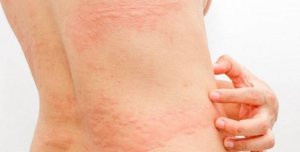How Allergies Affect Your Performance

There are few things more annoying than suffering from an allergy during moments of high physical demand. Some types of allergies affect your performance more than others. Allergies have many different forms, from hives, asthma and respiratory problems to anaphylactic shock.
Anaphylactic shock is the most serious of them all because it’s systemic and it can compromise your life. It’s useful to know the causes and the reactions to an allergic process, how it relates to sports and what measures you should take.
Next, we’ll analyze how allergies affect your performance in sports.
Allergy causes and adverse reactions
Allergies originate when your body reacts to the exposure of a substance that’s not necessarily harmful, but your body identifies it as such. These substances are known as allergens.

The first stage is sensitization. During this stage, your body generates antibodies to protect itself against the substance identified as a threat.
By doing this, it activates immunoglobulin E (IgE), which gives out the order to segregate histamines that produce the reactions.
Continuing with the process, the mechanism that causes the discomfort and alters some of your body functions, sets in motion. The allergy could even turn systemic, putting your life in danger if you don’t treat it quickly.
Among the most common allergens are foods; milk proteins, soy products, eggs, cereals, and nuts are some allergy triggers. Other elements that may affect you are pollen, or plants from the Graminae family, certain metals, animal dandruff, medicines, and insect repelling chemicals.
Even though doctors tend to consider allergies an immunological abnormality, genetics also play a role in their appearance. Other factors that may cause allergies are: genetically modified foods (GM foods), pesticides and environmental pollution.
How allergies affect your performance
Sports can trigger or intensify some allergies, causing hives, asthma and even anaphylactic shock.
There are a few occasions when you may need to suspend your training, so, it’s important to know your own physical condition. Be aware of how allergies affect your performance and what steps you should follow to prevent or treat them.
Allergy precautions that athletes should take
When you begin to show symptoms of allergies, you should consult with a specialist so that they can prescribe the proper treatment. But, the most important precaution that you can follow is prevention.
Hives in athletes
These are red spots on the skin that can burn and itch. There are factors related to exercise that stimulate the appearance of this allergy, including stress, effort or demand. High temperatures and sweat can also provoke hives in athletes.

Hives are a very common allergic reaction.
To prevent this condition, you must avoid working out under extreme temperatures, wear special sports clothing, take enough breaks and (if a doctor prescribed them to you) take some antihistamines.
Allergic asthma in athletes
- The typical bronchoconstriction caused by asthma that athletes experience is usually due to the loss of bronchial fluid as a result of the physical effort you exert. This is normal, but it tends to become more serious when you train at very low temperatures.
- Other possible causes of this allergy are pollen, colds and the flu. People who work out must try to avoid those three factors. The athlete should be ready for possible asthma crisis, always keeping the proper medication at hand.
- Warming up with breathing exercises is a useful prophylactic measure for those who suffer from asthma. You can do this by breathing in through your nose and exhaling through your mouth, slowly and deeply, several times.
- When facing an asthma crisis, the individual must stop the workout immediately. They must evaluate if by doing so and with the help of the medication the crisis stops, or if they’ll need to go to the hospital.
Exercise-induced anaphylaxis
This is a very serious adverse reaction that’s characterized by being systemic, meaning it affects several organs at the same time. It affects your skin and your respiratory and cardiovascular systems.
The initial allergy is usually due to a specific food, but exercise can aggravate this. Ultimately it can turn into anaphylactic shock.
This is usually a medical emergency that requires corticosteroids, antihistamines, and adrenaline. Health personnel are trained in administering this medication.
Either way, suffering from allergies shouldn’t limit your physical activity. If you know your reactions and act accordingly, with the correct precautions and measures, you won’t need to suspend your daily training program.
There are few things more annoying than suffering from an allergy during moments of high physical demand. Some types of allergies affect your performance more than others. Allergies have many different forms, from hives, asthma and respiratory problems to anaphylactic shock.
Anaphylactic shock is the most serious of them all because it’s systemic and it can compromise your life. It’s useful to know the causes and the reactions to an allergic process, how it relates to sports and what measures you should take.
Next, we’ll analyze how allergies affect your performance in sports.
Allergy causes and adverse reactions
Allergies originate when your body reacts to the exposure of a substance that’s not necessarily harmful, but your body identifies it as such. These substances are known as allergens.

The first stage is sensitization. During this stage, your body generates antibodies to protect itself against the substance identified as a threat.
By doing this, it activates immunoglobulin E (IgE), which gives out the order to segregate histamines that produce the reactions.
Continuing with the process, the mechanism that causes the discomfort and alters some of your body functions, sets in motion. The allergy could even turn systemic, putting your life in danger if you don’t treat it quickly.
Among the most common allergens are foods; milk proteins, soy products, eggs, cereals, and nuts are some allergy triggers. Other elements that may affect you are pollen, or plants from the Graminae family, certain metals, animal dandruff, medicines, and insect repelling chemicals.
Even though doctors tend to consider allergies an immunological abnormality, genetics also play a role in their appearance. Other factors that may cause allergies are: genetically modified foods (GM foods), pesticides and environmental pollution.
How allergies affect your performance
Sports can trigger or intensify some allergies, causing hives, asthma and even anaphylactic shock.
There are a few occasions when you may need to suspend your training, so, it’s important to know your own physical condition. Be aware of how allergies affect your performance and what steps you should follow to prevent or treat them.
Allergy precautions that athletes should take
When you begin to show symptoms of allergies, you should consult with a specialist so that they can prescribe the proper treatment. But, the most important precaution that you can follow is prevention.
Hives in athletes
These are red spots on the skin that can burn and itch. There are factors related to exercise that stimulate the appearance of this allergy, including stress, effort or demand. High temperatures and sweat can also provoke hives in athletes.

Hives are a very common allergic reaction.
To prevent this condition, you must avoid working out under extreme temperatures, wear special sports clothing, take enough breaks and (if a doctor prescribed them to you) take some antihistamines.
Allergic asthma in athletes
- The typical bronchoconstriction caused by asthma that athletes experience is usually due to the loss of bronchial fluid as a result of the physical effort you exert. This is normal, but it tends to become more serious when you train at very low temperatures.
- Other possible causes of this allergy are pollen, colds and the flu. People who work out must try to avoid those three factors. The athlete should be ready for possible asthma crisis, always keeping the proper medication at hand.
- Warming up with breathing exercises is a useful prophylactic measure for those who suffer from asthma. You can do this by breathing in through your nose and exhaling through your mouth, slowly and deeply, several times.
- When facing an asthma crisis, the individual must stop the workout immediately. They must evaluate if by doing so and with the help of the medication the crisis stops, or if they’ll need to go to the hospital.
Exercise-induced anaphylaxis
This is a very serious adverse reaction that’s characterized by being systemic, meaning it affects several organs at the same time. It affects your skin and your respiratory and cardiovascular systems.
The initial allergy is usually due to a specific food, but exercise can aggravate this. Ultimately it can turn into anaphylactic shock.
This is usually a medical emergency that requires corticosteroids, antihistamines, and adrenaline. Health personnel are trained in administering this medication.
Either way, suffering from allergies shouldn’t limit your physical activity. If you know your reactions and act accordingly, with the correct precautions and measures, you won’t need to suspend your daily training program.
This text is provided for informational purposes only and does not replace consultation with a professional. If in doubt, consult your specialist.








